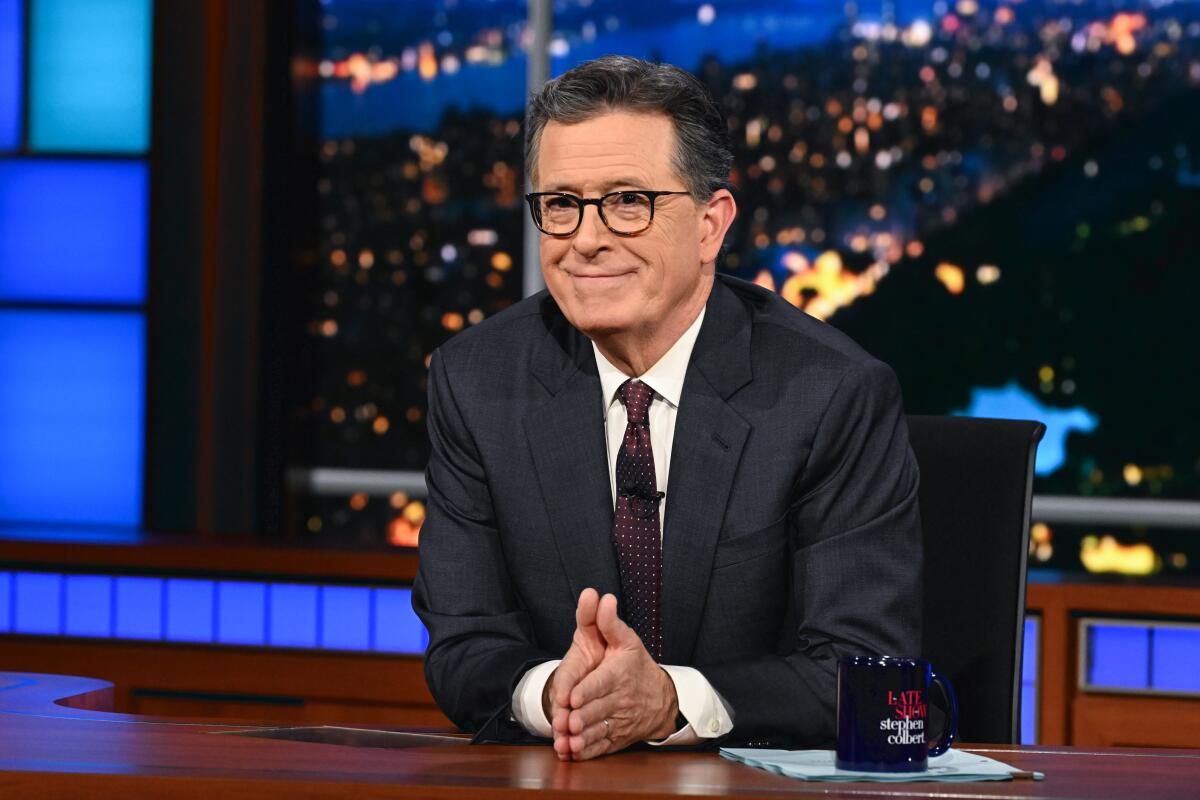Stephen Colbert Throws Down Gauntlet as Late-Night Allies Rally for Comedy Uprising

In a move that has sent shockwaves through television, Stephen Colbert has issued a fiery warning that could reshape the future of late-night comedy. The
Late Show host, long known for his sharp wit and fearless political satire, declared in no uncertain terms: “If CBS thinks they can shut me up, they clearly haven’t met the monsters of late-night yet.”
The statement, delivered with Colbert’s trademark mix of humor and defiance, has already become the rallying cry for what some are calling the most audacious comedy uprising in decades. Within days of his declaration, fellow hosts Jimmy Fallon, Seth Meyers, and John Oliver were reported to be quietly backing Colbert, forming an unlikely coalition that could challenge network boundaries and transform the very nature of late-night television.
A Battle Brewing Behind the Cameras
Industry insiders suggest that tensions between Colbert and CBS executives have been building for months. While Colbert remains one of the most-watched figures in late-night, sources claim the network has pushed back against his increasingly pointed political segments, fearing alienation of key demographics and advertisers.
Colbert’s recent quip, interpreted by many as a shot across CBS’s bow, appears to confirm those reports. “Stephen has never been one to hold back,” said one producer familiar with the situation. “When you try to rein him in, you don’t get compliance. You get defiance. And this time, he’s not standing alone.”
The Alliance of Late-Night “Monsters”

The so-called “monsters of late-night” — Fallon, Meyers, and Oliver — are a diverse group of hosts with their own styles and audiences. Fallon, with his playful skits and celebrity games; Meyers, with his razor-sharp political commentary; and Oliver, with his deep-dive satirical investigations, may not always compete directly with Colbert, but they share one thing in common: frustration with corporate oversight.
According to reports, the four hosts have been in quiet conversations about uniting in subtle but impactful ways, from coordinated monologues on shared issues to joint digital campaigns that bypass network executives altogether. While no official confirmation has been made, rumors of “secret calls” and “group strategy sessions” have fueled speculation of a broader uprising.
“This could be unprecedented,” noted television historian Dr. Marc Elias. “We’ve never seen late-night hosts band together like this, not even during the golden age of Carson or Letterman. If they’re serious, it could shift the balance of power in entertainment.”
Fans React With Excitement and Alarm
As news of Colbert’s warning spread, fans took to social media with a mix of exhilaration and concern. Many hailed the idea of a united front as “the Avengers of late-night,” while others worried that network backlash could jeopardize their favorite shows.
“Imagine Colbert, Fallon, Meyers, and Oliver all tackling the same topic in one night,” one fan tweeted. “It would be unstoppable.”
Others were more cautious: “Networks don’t like being challenged. If they push back, we could see cancellations or drastic changes. This is risky business.”
Networks Under Pressure
Behind the scenes, network executives are said to be monitoring the situation closely. For CBS, NBC, and HBO, the stakes are high. Late-night programming has already been under pressure in recent years, with streaming services and viral social media clips drawing audiences away from traditional broadcasts.
A coordinated rebellion by the genre’s biggest stars could disrupt the delicate balance between creative freedom and corporate control. “Executives rely on advertisers, and advertisers rely on stability,” explained media analyst Karen Liu. “If hosts start operating outside of that framework, the networks could lose control of their own brands.”
Yet, others argue that networks may have little choice but to adapt. “These hosts have massive online followings,” Liu added. “If pushed, they could bypass traditional TV altogether and take their audiences with them.”
Comedy as Protest

At its heart, Colbert’s warning reflects a larger truth about comedy: its power as protest. From the days of Lenny Bruce to Jon Stewart, comedians have wielded humor as a weapon against authority, hypocrisy, and control. Colbert’s apparent refusal to bow to CBS represents the continuation of that tradition.
“Comedy has always been about pushing boundaries,” said cultural critic Dana Whitmore. “When networks try to sanitize it, they strip it of its purpose. Colbert understands that — and so do Fallon, Meyers, and Oliver.”
What Comes Next
The future of this so-called “comedy uprising” remains uncertain. For now, the speculation of joint efforts and quiet alliances has injected a jolt of excitement into the late-night landscape. Viewers will be watching closely for signs of collaboration, whether in shared themes, surprise guest appearances, or coordinated social media campaigns.
One thing, however, is clear: Stephen Colbert has no intention of going quietly. His defiant words — and the rumored support of his late-night peers — suggest that a seismic shift could be on the horizon.
Whether it results in a revolution or a standoff, Colbert has ensured that the spotlight is firmly on him — and that late-night television is anything but predictable.